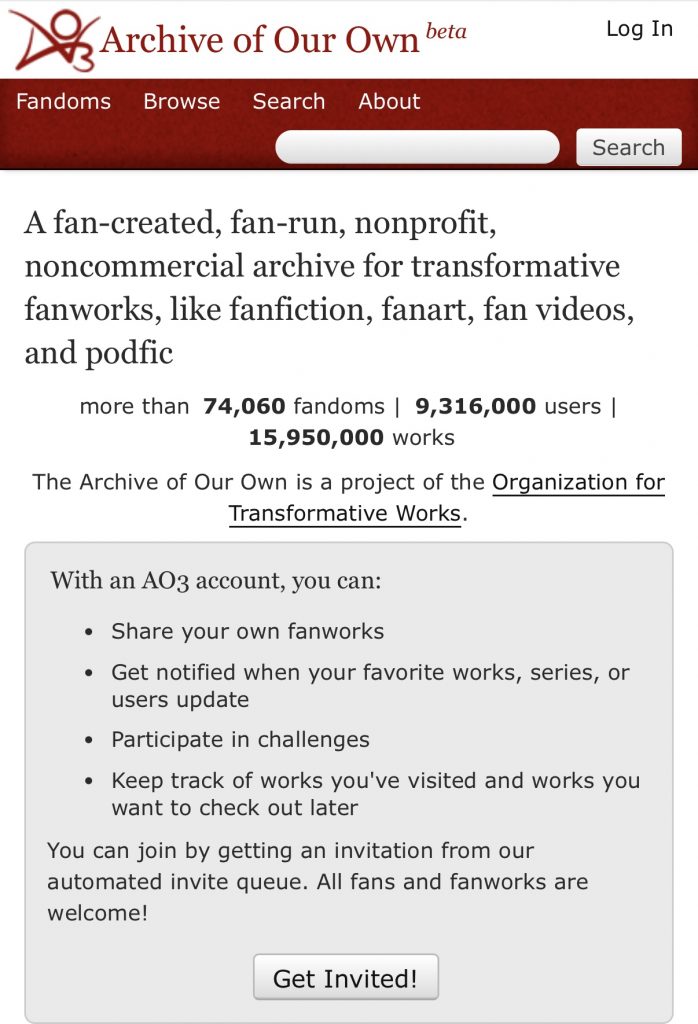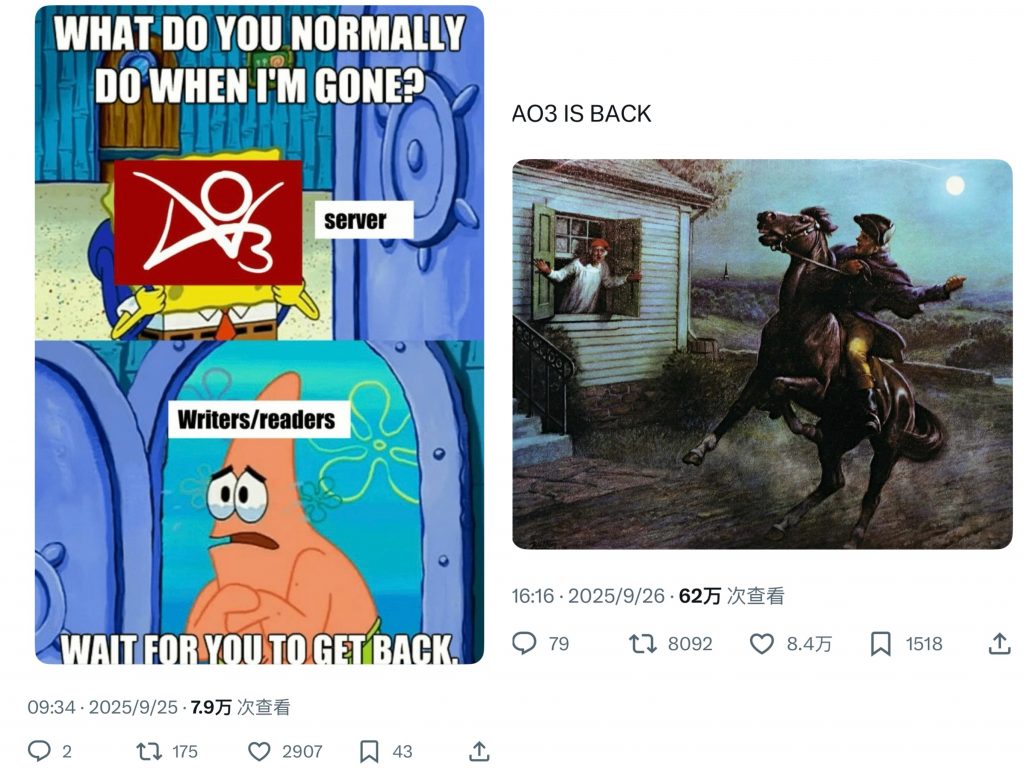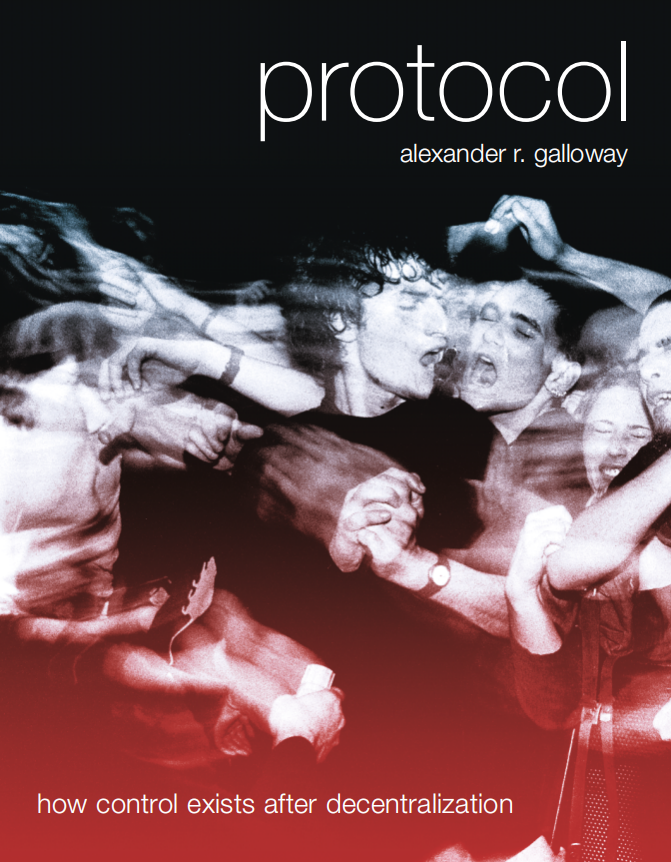“A woman must have money and a room of her own if she is to write fiction; and that, as you will see, leaves the great problem of the true nature of woman and the true nature of fiction unsolved.”
Woolf, Virginia. A Room of One’s Own.London:Hogarth Press,1929
What lies within this Archive?
The name “AO3” derives from Virginia Woolf’s book A Room of One’s Own, in which Woolf emphasizes the critical importance of women having independent economic foundations and unfettered creative spaces for literary creation. Drawing inspiration from Woolf’s vision, AO3’s founder Naomi Novik positioned the platform as an archive rather than an online community. Its core mission is to provide fan creators with a virtual creative sanctuary free from commercial pressures and gender biases, championing creative freedom while opposing the profit-driven monetization of fan works that undermines the grassroots spirit of fan culture.By establishing a non-profit operational model and a strict content moderation framework centered on the maximum inclusivity principle, AO3 has not only preserved a vast number of fan creations spanning diverse genres-from literary adaptations to multimedia works-but also built a supportive ecosystem where creators can exchange ideas, receive feedback, and find resonance with like-minded audiences. For many fan creators, AO3 is more than just a storage platform, it is a symbolic space that reclaims the autonomy of creative expression, allowing marginalized voices and niche narratives to avoid being filtered out by mainstream commercial algorithms.

How does AO3 shape our self-identify?
Similar to how libraries categorize book collections, AO3 implements a highly sophisticated tagging system. Creators add tags to make their works more discoverable by target audiences while specifying the potential content of each piece. Readers, on the other hand, use these tags to quickly search for content that aligns with their preferences. Simply put, the tagging system enables creators to accurately provide content warnings and categorize their works, and allows readers to find exactly what they are looking for-an interaction that fosters a high level of trust and rapport between the two groups.This sets AO3 apart from most social media platforms. Literary-style titles often make it difficult for readers to search solely by the name of a film, TV show, or area of interest, so AO3’s interactive mechanism relies heavily on tags. Both creators and readers adhere strictly to this unspoken protocol. Throughout this process, users’ sense of identity is repeatedly reinforced; for instance, they may develop a psychological sense of belonging as “Sherlock Holmes fans” within the platform, rather than just as individual users.

AO3’s clear positioning as a “fan fiction archive” and its dedicated legal team provide creators with a relatively secure space to publish their works, freeing them from the fear of being reported or facing copyright lawsuits. It also serves as a vital platform for women, LGBTQ+ communities, and other groups to express themselves and share their stories, amplifying marginalized voices that are often overlooked in mainstream narratives and helping them find resonance.Interaction on AO3 tends to be a spontaneous process of “finding one’s tribe,” distinct from passive algorithmic recommendations. When reading on AO3, users hold significant agency, forging community bonds driven by shared interests. No matter where you are or how niche your favorite works or ships may be, you can always find like-minded people on AO3. It breaks down geographical barriers and builds “interest-based communities” rooted in common passions.Compared to the likes, shares, and comments on social media, AO3’s comments and kudos lean more toward in-depth communication. Readers engage in thoughtful analysis of plots, discussions about characters, and form a high-quality feedback loop with creators. This strengthens the cohesion within the community, allowing users to experience the profound satisfaction of finding a true soulmate who understands one’s deepest passions.
The ambivalence I feel when using AO3
In his book Protocol: How Control Exists After Decentralization, Alexander Galloway notes that for platforms functioning as infrastructure, their operational rules themselves largely shape their audiences-a defining feature of Societies of Control (in contrast to Sovereign Societies and Disciplinary Societies). Distributed network systems establish shared, mandatory rules as entry thresholds, enabling individuals to achieve full self-governance through participation. While this may seem free and non-coercive, people are in fact constrained by protocols at every turn.A sophisticated tagging system does not guarantee that every user can label their works accurately. There even emerges chaos where tags are randomly added to gain more clicks. It is also common to encounter plot elements in a work that the creator failed to warn about at the beginning,a genuine “psychological shock” for readers. However, the platform’s governance primarily relies on self-restraint. Thus, when confronted with malicious content featuring excessive violence, the only option is to close the page immediately. After all, creative freedom is the cornerstone of AO3’s existence,without this freedom AO3 cannot survive. Yet this very freedom has indeed given rise to numerous problems.I often wonder if this is a necessary sacrifice to obtain the things I love, but I have been unable to find an answer no matter how hard I think.




I appreciated the background on how AO3 got its name, I did not know that, nor did I think to look into it after being introduced to the site. It is interesting to connect the tag system to power relations and self restraint. I think its interesting because as a platform the site does give a lot of power and organization to the authors, but exhibiting self restraint should be a common practice for us on the internet at all times, so it makes sense to extend it to ao3.
The medium is the message applies here nicely as well because in a sense posting a story on ao3 as the medium is much different than publishing it as a book again because of the community it fosters and more.
Although I’m a long-time AO3 user, I had no idea where its name came from until I started writing this blog. Coincidentally, as I was typing away at my keyboard, A Room of One’s Own by Virginia Woolf was lying right behind me—something I found quite amusing. Delving into the details of this system I know so well has also given me a fresh perspective on something that once felt familiar and unchanging. Thank you so much for having this discussion with me,it’s been really interesting.
Wow, really interesting!
I am also a long-time reader on AO3, although I haven’t published any work on the archive. I didn’t know this about the history of the archive and I thank you for sharing it, it is really interesting to know.
I remember a video on youtube by the creator ColeyDoesThings ‘the infamous fanfic that changed AO3 forever’ where she explains how one fanfic that used so many tags it became a huge problem when eventually AO3 had to step in to deal with it. I think this demonstrates one type of issue that self-governance can come across with when self-restraint is not exercised.
I have never heard of this archive before, thank you for bringing it to my attention!
The bow you span from Virgina Woolf, over fan fictions over to Galloway is indeed super interesting. It reminds me of a lecture I visited last year about “Reanimating the archive”, turning it into something breathing and circular instead of static and of the past. We said already back then that digital concepts then of course make a lot of sense and offer great solutions for keeping an archive alive. AO3 seems to be a great example of that!
Hi, thanks for sharing this blog! I’ve used AO3 for so many years and never really thought about the story behind it. Drawing its name from Virginia Woolf could not be more romantic. Reflecting on my own experience, I’ve always treated AO3 as a place where I store something deeply personal. I think it maintains a rare and delicate balance between the public and the private. However, I also recognise its importance in fandoms. I think the fact is that there is no absolute freedom in creation, as we always work within certain frames or boundaries. AO3 exists precisely because it is shaped as a platform of freedom – it reminds us of the possibility of creating certain kinds of work beyond commercial or institutional constraints. At the same time, I do think this freedom remains somewhat dreamlike, almost a form of wishful thinking, as you’ve pointed out, we are always contained and restricted in one way or another.